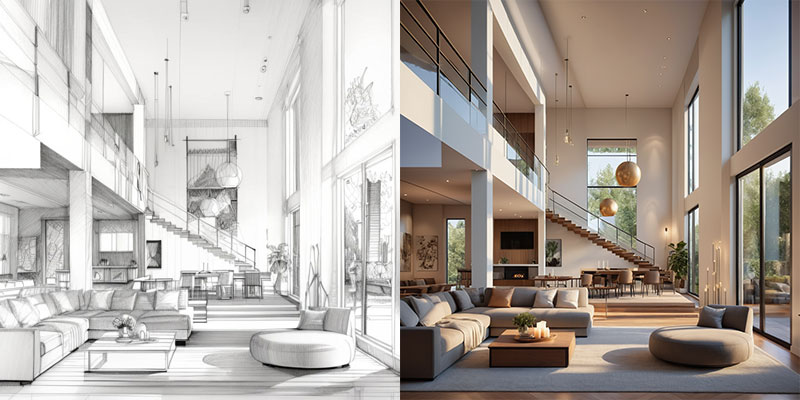친구를 초대하고 둘 다 무료 코인을 받으세요
1365
hamed karbasi
AI 건축 생성기
The facade of a residential house in Oman reflects the country's rich cultural heritage while embracing modern elements suited to the hot desert climate. The design is characterized by a harmonious blend of traditional Arabian architectural features and contemporary styles.
The exterior of the house features a combination of natural stone, stucco, and white plaster, typical of Omani architecture, creating a light and airy feel. The color palette is dominated by warm, earthy tones, such as soft creams, beige, and sandstone, which help reflect the intense heat and blend with the surrounding desert landscape. Decorative elements like geometric patterns or intricate mashrabiya screens (wooden latticework) adorn windows and balconies, adding a touch of traditional flair while providing shade and privacy.
Large, arched windows and doors are incorporated into the design, reflecting the influence of Islamic architecture, which often emphasizes openness to the outdoors while protecting from the harsh sun. The windows may feature decorative metal or wooden grilles, allowing for air circulation and ventilation without sacrificing privacy. Some facades may also include deep overhangs or canopies that offer shade to keep the interiors cool.
A central courtyard or outdoor space might be part of the design, with lush greenery such as date palms, ornamental plants, and water features like a small fountain or reflecting pool, enhancing the tranquil atmosphere. The layout allows for a connection between the interior and the exterior, where the cool breeze can circulate freely through the open spaces, creating an inviting environment even in the heat of the day.
The overall facade is elegant and practical, blending modern functionality with the timeless charm of Omani tradition. It's designed to withstand the climate while maintaining a sense of sophistication and cultural identity.
장면:
거주 건물
시점:
드론 뷰,항공 뷰
부정적 프롬프트:
HEAVY
OLD
비율:
1:1
0
리믹스
아직 댓글이 없습니다

0
좋아요보고
1365
hamed karbasi
AI 건축 생성기
The facade of a residential house in Oman reflects the country's rich cultural heritage while embracing modern elements suited to the hot desert climate. The design is characterized by a harmonious blend of traditional Arabian architectural features and contemporary styles.
The exterior of the house features a combination of natural stone, stucco, and white plaster, typical of Omani architecture, creating a light and airy feel. The color palette is dominated by warm, earthy tones, such as soft creams, beige, and sandstone, which help reflect the intense heat and blend with the surrounding desert landscape. Decorative elements like geometric patterns or intricate mashrabiya screens (wooden latticework) adorn windows and balconies, adding a touch of traditional flair while providing shade and privacy.
Large, arched windows and doors are incorporated into the design, reflecting the influence of Islamic architecture, which often emphasizes openness to the outdoors while protecting from the harsh sun. The windows may feature decorative metal or wooden grilles, allowing for air circulation and ventilation without sacrificing privacy. Some facades may also include deep overhangs or canopies that offer shade to keep the interiors cool.
A central courtyard or outdoor space might be part of the design, with lush greenery such as date palms, ornamental plants, and water features like a small fountain or reflecting pool, enhancing the tranquil atmosphere. The layout allows for a connection between the interior and the exterior, where the cool breeze can circulate freely through the open spaces, creating an inviting environment even in the heat of the day.
The overall facade is elegant and practical, blending modern functionality with the timeless charm of Omani tradition. It's designed to withstand the climate while maintaining a sense of sophistication and cultural identity.
장면:
거주 건물
시점:
드론 뷰,항공 뷰
부정적 프롬프트:
HEAVY
OLD
비율:
1:1
0
리믹스
아직 댓글이 없습니다



























